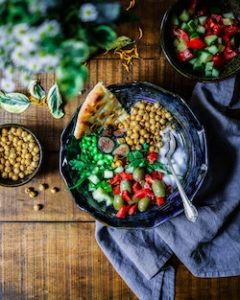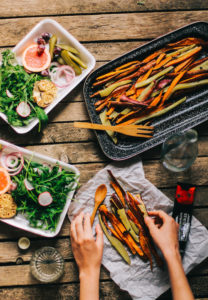Joslin Morrison – Nutritional Therapist
2019 has been called ‘Year of the Vegan’. Have you considered going vegan, or do you follow a vegan diet? Thousands of people did when they took up veganism in January, otherwise known as ‘Veganuary’. With more choice of vegan food in shops, recipes on social media, and the TV and radio discussing veganism on a regular basis, it is definitely entering the mainstream. One in six food products launched in 2018 carried a vegan claim, and there are estimated to be over half a million vegans in the UK, over three times more than in 2006.
Most people choose to be vegan for ethical, environmental or animal welfare reasons, or to improve their health. Research has shown that a vegan diet can be associated with lower risks of heart disease, high-blood pressure, type two diabetes and obesity. This is most probably due to a higher consumption of fruit and vegetables, and vegetarians and vegans tend to adopt healthier lifestyle choices.
However, just because something is vegan, does not automatically mean it is healthier. There are a huge amount of processed, packaged, nutrient-poor vegan options available to the consumer, which do not contribute to better health or a healthier planet.
Humans are omnivores (able to eat both plants and meat) and we have a physiological benefit from eating some animal products. Meat, fish and shellfish are among the most nutrient-dense foods we can eat. We can get these nutrients from plant-based sources, but they need multiple-step conversions before being able to be used by the body.
Following a restrictive diet such as veganism, requires careful planning to avoid deficiencies that can cause unwanted symptoms and illnesses. Several studies have shown that vegans and vegetarians can be prone to deficiencies in calcium, iron, zinc, B12, vitamin A and vitamin D and essential fatty acids. Deficiencies in these nutrients can take months or years to develop, and aren’t always routinely tested for.
With good planning, and a strong awareness for a balanced intake of key nutrients, it is possible to get all you need from a vegan diet. But you must plan. Cooking from scratch and not relying on processed vegan products will help you to get protein, healthy fats, and vitamins and minerals with each meal. According to the Alliance for Natural Health, your daily food intake as a vegan should consist of:
40 % vegetables and 10% fruits (unprocessed, and all the 6 ‘colors of the rainbow’)
10 % grains (whole grains such as amaranth, oats, buckwheat, quinoa, brown rice etc.)
10 % healthy fats (avocados, almonds, walnuts, brazil nuts, macadamia nuts, chia seeds, flax seeds, coconut yogurt)
25 % protein rich foods (peas, chickpeas, beans, lentils, tofu, tempeh, hemp and chia seeds)
5 % concentrated nutrients (fresh herbs and spices, herbal teas)
There is no denying that a diet rich in plant-based foods will do wonders to our health, but not enough long-term studies have been done to assess the impacts of a vegan diet on the body. Just like any diet — meat-eating or vegan — if you eat processed junk food options, you will be putting your body at a higher risk of diseases.
If you are thinking of changing to a vegan diet, or more plant based way of eating, it is advisable to get some advice from a registered nutritional therapist, like myself, who can help you plan and ensure that you remain nourished and healthy.
For more information, or to book an appointment, please email: joslinnutrition@gmail.com















































